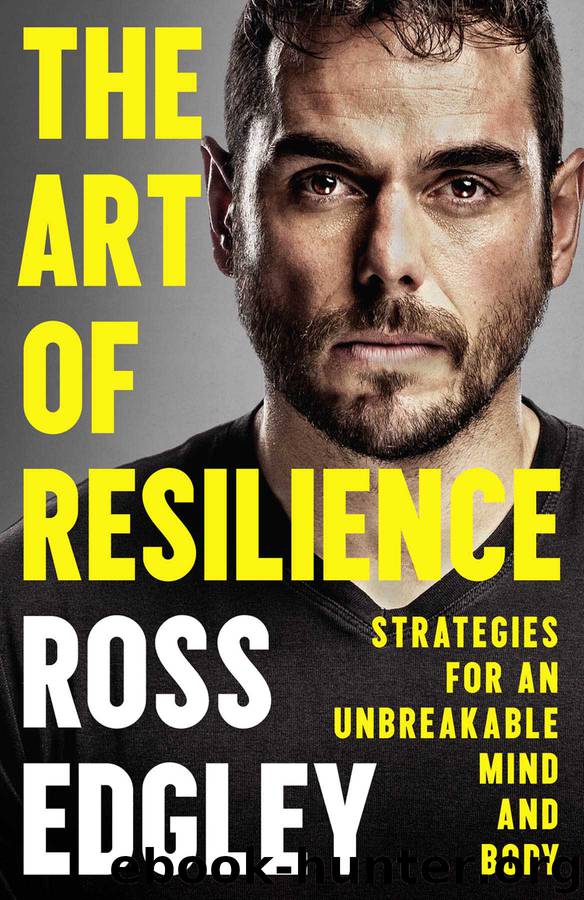The Art of Resilience by Ross Edgley

Author:Ross Edgley
Language: eng
Format: epub
Publisher: HarperCollins Publishers
Published: 2020-03-28T00:00:00+00:00
RESEARCH RESTRICTIONS
Being mentally and physically tough is not enough to be truly resilient. You also have to be strategically strong and study your suffering. Based on the teachings of the psychobiological model of fatigue, ‘Fatigue is a central brain perception, which is based on the sum of the sensory feedback from a variety of organs to the brain, and which is expressed physically as the alteration in pacing strategy (running, swimming or cycling speed) caused by a reduction in the muscle mass activated by the motor cortex in the brain.’ This is according to Tim Noakes, a world-renowned authority on endurance performance in sport (and the scientist behind the central governor theory that we discussed earlier).
Put more simply, it’s sensory feedback from the legs, lungs and heart that triggers our brain to slow us down and prevents us from reaching complete exhaustion and hurting ourselves. Research from the British Journal of Sports Medicine also states this feedback varies depending on the specific exercise, sport or adventure. ‘The mechanisms of fatigue vary depending on the specific exercise stressor … and fatigue varies with the type of exercise.’83
This is why it’s not enough to be mentally and physically tough with a superhuman ability to tolerate pain and fatigue. You also need to be strategically strong to identify this sensory feedback and manage it before your body and brain shut down. As further studies from the British Journal of Sports Medicine found, ‘Fatigue is the result of the complex interaction of physiological systems and the brain … all changes within the body act as different signallers which modulate control processes in the brain telling us to stop or slow down.’84
Therefore, the key to be strategically strong and resilient is managing the various exercise stressors so that they don’t trigger signallers to tell the brain to stop or slow down. This is the only way to keep the brain happy while at the same time pushing as hard as is physically possible in your chosen sport. In keeping with our jellyfish example, this means being resilient is not about enduring the pain of a tentacle sting, it’s about being wise and experienced enough to know how to avoid it.
How do we do this? You must limit limitations by researching restrictions. This is something we’ve known for years, since, although the ancient stoics weren’t aware of the psychobiological model of fatigue, Marcus Aurelius was aware of our perception to pain and the need to limit limitations. He said, ‘Whenever you suffer pain, keep in mind that it’s nothing to be ashamed of and that it can’t degrade your guiding intelligence, nor keep it from acting rationally and for the common good. And in most cases, you should be helped by the saying of Epicurus, that pain is never unbearable or unending, so you can remember these limits and not add to them in your imagination. Remember too that many common annoyances are pain in disguise, such as sleepiness, fever and loss of appetite.’
With this said,
Download
This site does not store any files on its server. We only index and link to content provided by other sites. Please contact the content providers to delete copyright contents if any and email us, we'll remove relevant links or contents immediately.
Sea Survival Handbook by Keith Colwell(1796)
Deep by James Nestor(1789)
Fatal Storm by Rob Mundle(1788)
Breath by James Nestor;(1761)
The River by Peter Heller(1698)
Lonely Planet Australia by Lonely Planet(1676)
Discover Australia by Lonely Planet(1586)
Iced In by Chris Turney(1579)
Lonely Planet Maldives (Travel Guide) by Planet Lonely & Masters Tom(1427)
One Girl One Dream by Dekker Laura(1355)
Ten Degrees of Reckoning: The True Story of a Family's Love and the Will to Survive by Hester Rumberg(1346)
Looking for a Ship by John McPhee(1320)
Lonely Planet Australia (Travel Guide) by Lonely Planet & Lonely Planet(1309)
Chicken Soup for the Ocean Lover's Soul by Jack Canfield(1291)
South with the Sun by Lynne Cox(1222)
The Wave In Pursuit of the Rogues, Freaks and Giants of the Ocean(1217)
Marlinspike Sailor's Arts and Crafts by Barbara Merry(1208)
Diver Down by Michael Ange(1194)
The Golden Rules: 10 Steps to World-Class Excellence in Your Life and Work by Bob Bowman & Charles Butler(1159)
